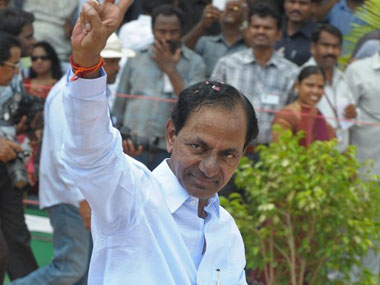Months after his resounding victory in the assembly election, Telangana Chief Minister K Chandrashekhara Rao continues fighting demons, some non-existing and some of his own creation. He has so far displayed an unusual penchant for igniting avoidable controversies. He is engaged in a proxy war with two TV channels with multi-system operators (MSOs) standing in as the infantry in the battle with the channels. His brusque remark on the media - “burying it 10 km deep in the earth” - is still fresh. The controversy over the nativity of people of Telangana is yet to die down. KCR’s contention that people whose ancestors were living in Telangana before November 1, 1956 (the formation of Andhra Pradesh on linguistic basis) would be treated as the natives of Telangana triggered political outbursts. The non-renewal of recognition to 174 engineering colleges was seen as a hostile attempt to scuttle the managements of engineering colleges, most of which are perceived to be from Andhra State. In the process, he rubbed the Andhra government too on the wrong side. The controversy over the number plates and collection of tax for contract carriages went to the High Court and the government had to eat a humble pie on these contentious issues. [caption id=“attachment_1722719” align=“alignleft” width=“380”]  K Chandrasekhar Rao. AFP.[/caption] The Hero MotoCorp which wanted to set up a plant in Telangana suddenly made a volte-face and moved to Andhra Pradesh. Marking the 100-day celebration of Chandrababu Naidu’s government, Pawan Munjal’s company signed an MoU with AP Government for investing Rs 1,800 crore in Chittoor district and producing motorcycles in a year-and-a half. Procter and Gamble which invested USD 180 million so far for the establishment of a manufacturing plant at Kothur on the outskirts of Hyderabad is slowly pulling out owing to numerous hurdles caused by officials of the Telanagana government. The latest controversy involves the ambitious metro project. L&T Metro Rail Chief Executive and Managing Director VB Gadgil on September 10 dashed a letter suggesting that the Telangana government take over the massive metro rail projects if the latter could not resolve some of the issues arising in its implementation. The issue over the realignment of the route and changing of construction pattern from elevated rail to underground rail at some points as demanded by the chief minister irked the L&T Metro Rail, as it involves huge costs and the company perceives it as impossible to change the course on those lines. This is actually avoidable. Two Telugu newspapers frontpaged the letter written by Gadgil to the State Government, in which, among other things, he mentioned that the multi-billion dollar project might not be financially viable for L&T to proceed any further, as Hyderabad was no longer the most favoured destination for investments. Bifurcation of Andhra Pradesh had clouded the progress of Hyderabad and that the real estate of Metro stations might not turn out to be commercially advantageous. However, KCR stepped in on Wednesday and tried to extricate the government out of the discomfiture caused by L&T. Gadgil issued a statement, albeit at the behest of the government, saying that there was no problem with the metro works and they were going ahead as planned. As regards the deviations sought by the government, he said L&T Metro did not receive any communication from Telangana state government on this. He, however, pointed out that the media meticulously chose portions of it. The CMO blamed a section of the media for attempting to malign the image of Metro Rail project. The press release by the CMO said: “The issue of a news item published in couple of newspapers today, attempting to damage the interests of Telangana state has come up during the review. Though correspondence between the L&T and Metro is a routine thing, these selected newspapers have chosen to publish the latest correspondence mischievously and in isolation. It is felt in the review meeting that this is a deliberate attempt to project the Metro Rail project in a bad shape.” While Gadgil confirmed the writing of the letter on September 10, his defense that correspondence was common with the government when such massive projects were underway sounded essentially feeble.
Months after his resounding victory in the assembly election, Telangana Chief Minister K Chandrashekhara Rao continues fighting demons, some non-existing and some of his own creation. He has so far displayed an unusual penchant for igniting avoidable controversies.
Advertisement
End of Article


)
)
)
)
)
)
)
)
)



